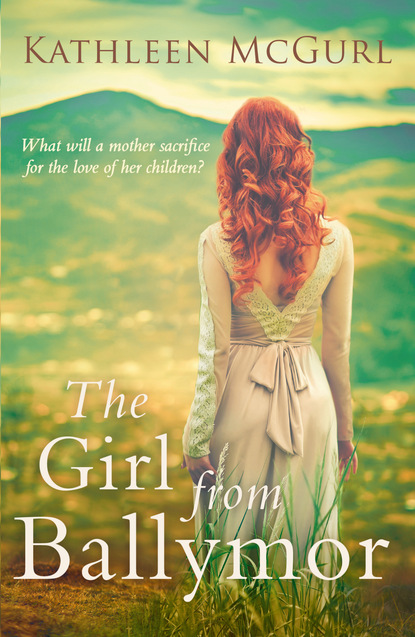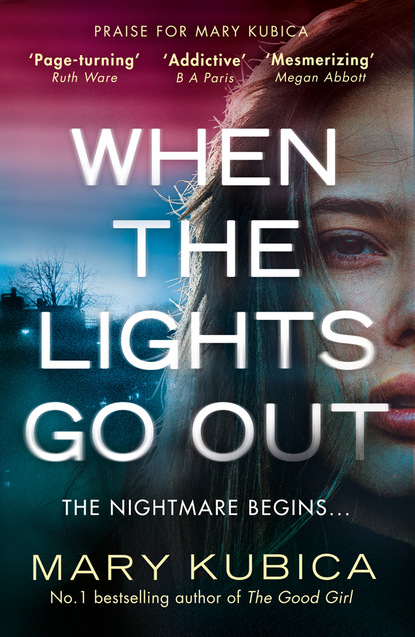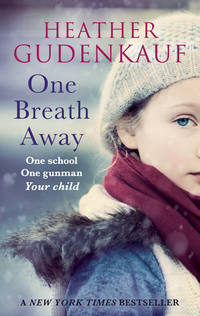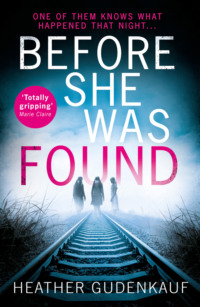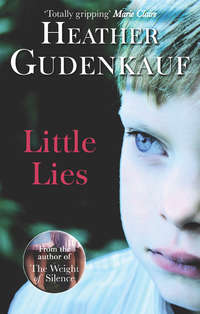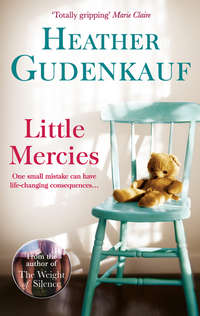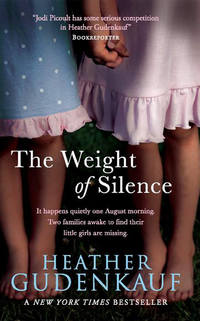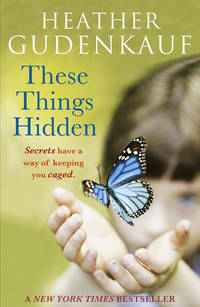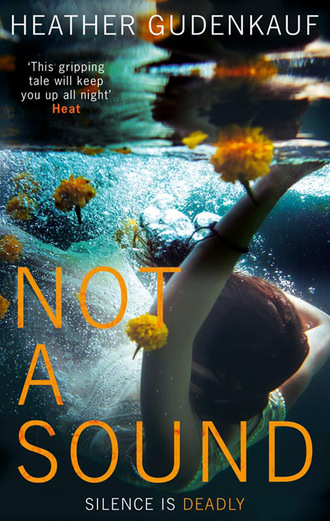
Полная версия
Not A Sound

A shocking discovery and chilling secrets converge in this latest novel from New York Times bestselling author Heather Gudenkauf
When a tragic accident leaves nurse Amelia Winn deaf, she spirals into a depression that ultimately causes her to lose everything that matters—her job, her husband, David, and her stepdaughter, Nora. Now, two years later and with the help of her hearing dog, Stitch, she is finally getting back on her feet. But when she discovers the body of a fellow nurse in the dense bush by the river, deep in the woods near her cabin, she is plunged into a disturbing mystery that could shatter the carefully reconstructed pieces of her life all over again.
As clues begin to surface, Amelia finds herself swept into an investigation that hits all too close to home. But how much is she willing to risk in order to uncover the truth and bring a killer to justice?
New York Times bestselling author Heather Gudenkauf has been described as “masterful” and “intelligent” and compared to Lisa Scottoline and Jodi Picoult. Introducing her most compelling heroine yet, she delivers a taut and emotional thriller that proves she’s at the top of her class.
Not a Sound
Heather Gudenkauf

Praise for
Heather Gudenkauf
‘This gripping tale will keep you up all night’
Heat
‘An action packed thriller… Gudenkauf’s best book yet!’
Mary Kubica
‘Fans of Jodi Picoult will devour this great thriller’
Red Magazine
‘This tense tale keeps you hooked right up to the last page’
My Weekly
‘A great thriller’
Radio Times
‘A real page-turner’
Woman’s Own
‘Tension builds as family secrets tumble from the closet’
Woman & Home
‘A gripping thriller’
Inside Soap
‘Deeply moving and lyrical… it will haunt you all summer’
Company
‘A powerhouse of a debut novel’
Tess Gerritsen
‘Totally gripping’
Marie Claire
‘Heart-pounding and compelling’
Diane Chamberlain
Also by Heather Gudenkauf
Missing Pieces
The Weight of Silence
These Things Hidden
One Breath Away
Little Mercies
HEATHER GUDENKAUF is the critically acclaimed and New York Times bestselling author of The Weight of Silence, These Things Hidden, One Breath Away and Little Mercies. Her debut novel, The Weight of Silence was picked for The TV Bookclub. She lives in Iowa with her family.
Read more about Heather and her novels at www.HeatherGudenkauf.com
For Erika Imranyi – who knows how to make lemonade from lemon squares.
Contents
Cover
Back Cover Text
Title Page
Praise
Booklist
About the Author
Dedication
Prologue
Chapter 1
Chapter 2
Chapter 3
Chapter 4
Chapter 5
Chapter 6
Chapter 7
Chapter 8
Chapter 9
Chapter 10
Chapter 11
Chapter 12
Chapter 13
Chapter 14
Chapter 15
Chapter 16
Chapter 17
Chapter 18
Chapter 19
Chapter 20
Chapter 21
Chapter 22
Chapter 23
Chapter 24
Chapter 25
Chapter 26
Author’s Note
Acknowledgments
Extract
Copyright
Prologue
I find her sitting all by herself in the emergency waiting room, her lovely features distorted from the swelling and bruising. Only a few patients remain, unusual for a Friday night and a full moon. Sitting across from her, an elderly woman coughs wetly into a handkerchief while her husband, arms folded across his chest and head tilted back, snores gently. Another man with no discernable ailment stares blankly up at the television mounted on the wall. Canned laughter fills the room.
I’m surprised she’s still here. We treated her hours ago. Her clothing was gathered, I examined her from head to toe, all the while explaining what I was doing step-by-step. She lay on her back while I swabbed, scraped and searched for evidence. I collected for bodily fluids and hairs that were not her own. I took pictures. Close-ups of abrasions and bruises. I stood close by while the police officer interviewed her and asked deeply personal private questions. I offered her emergency contraceptives and the phone number for a domestic abuse shelter. She didn’t cry once during the entire process. But now the tears are falling freely, dampening the clean scrubs I gave her to change into.
“Stacey?” I sit down next to her. “Is someone coming to get you?” I ask. I offered to call someone on her behalf but she refused, saying that she could take care of it. I pray to God that she didn’t call her husband, the man who did this to her. I hope that the police had already picked him up.
She shakes her head. “I have my car.”
“I don’t think you should be driving. Please let me call someone,” I urge. “Or you can change your mind and we can admit you for the night. You’ll be safe. You can get some rest.”
“No, I’m okay,” she says. But she is far from okay. I tried to clean her up as best I could but already her newly stitched lip is oozing blood, the bruises blooming purple across her skin.
“At least let me walk you to your car,” I offer. I’m eager to get home to my husband and stepdaughter but they are long asleep. A few more minutes won’t matter.
She agrees and stands, cradling her newly casted arm. We walk out into the humid August night. The full moon, wide faced and as pale as winter wheat lights our way. Katydids call back and forth to one another and white-winged moths throw themselves at the illuminated sign that reads Queen of Peace Emergency.
“Where are you staying tonight? You’re not going home, are you?”
“No,” she says but doesn’t elaborate more. “I had to park over on Birch,” she says dully. Queen of Peace’s lot has been under construction for the better part of a month so parking is a challenge. It makes me sad to think that not only did this poor woman, beaten and raped by her estranged husband, have to drive herself to the emergency room, there wasn’t even a decent place for her to park. Now there are five open parking spaces. What a difference a few hours can make in the harried, unpredictable world of emergency room care.
We walk past sawhorse barriers and orange construction cones to a quiet, residential street lined with sweetly pungent linden trees. Off in the distance a car engines roars to life, a dog barks, a siren howls. Another patient for the ER.
“My car is just up here,” Stacey says and points to a small, white four-door sedan hidden in the shadows cast by the heart-shaped leaves of the lindens. We cross the street and I wait as Stacey digs around in her purse for her keys. A mosquito buzzes past my ear and I wave it away.
I hear the scream of tires first. The high-pitched squeal of rubber on asphalt. Stacey and I turn toward the noise at the same time. Blinding high beams come barreling toward us. There is nowhere to go. If we step away from Stacey’s car we will be directly in its path. I push Stacey against her car door and press as close to her as I can, trying to make ourselves as small as possible.
I’m unable to pull my eyes away from bright light and I keep thinking that the careless driver will surely correct the steering wheel and narrowly miss us. But that doesn’t happen. There is no screech of brakes, the car does not slow and the last sound I hear is the dull, sickening thud of metal on bone.
1
Two Years Later...
Nearly every day for the past year I have paddle boarded, kayaked, run or hiked around the sinuous circuit that is Five Mines River, Stitch at my side. We begin our journey each day just a dozen yards from my front door, board and oar hoisted above my head, and move cautiously down the sloping, rocky bank to the water’s edge. I lower my stand-up paddleboard, the cheapest one I could find, into the water, mindfully avoiding the jagged rocks that could damage my board. I wade out into the shallows, flinching at the bite of cold water against my skin, and steady it so Stitch can climb on. I hoist myself up onto my knees behind him and paddle out to the center of the river.
With long even strokes I pull the oar through the murky river. The newly risen sun, intermittently peeking through heavy, slow-moving gray clouds, reflects off droplets of water kicked up like sparks. The late-October morning air is bracing and smells of decaying leaves. I revel in the sights and feel of the river, but I can’t hear the slap of my oar against the water, can’t hear the cry of the seagulls overhead, can’t hear Stitch’s playful yips. I’m still trying to come to terms with this.
The temperature is forecast to dip just below freezing soon and when it does I will reluctantly stow my board in the storage shed, next to my kayak until spring. In front of me, like a nautical figurehead carved into the prow of a sailing vessel, sits Stitch. His bristled coat is the same color as the underside of a silver maple leaf in summer, giving him a distinguished air. He is three years old and fifty-five pounds of muscle and sinew but often gets distracted and forgets that he has a job to do.
Normally, when I go paddling, I travel an hour and a half north to where Five Mines abruptly opens into a gaping mouth at least a mile wide. There the riverside is suddenly lined with glass-sided hotels, fancy restaurants, church spires and a bread factory that fills the air with a scent that reminds me of my mother’s kitchen. Joggers and young mothers with strollers move leisurely along the impressive brick-lined river walk and the old train bridge that my brother and I played on as kids looms in the distance—out of place and damaged beyond repair. Kind of like me.
Once I catch sight of the train bridge or smell the yeasty scent of freshly baked bread I know it’s time to turn around. I much prefer the narrow, isolated inlets and sloughs south of Mathias, the river town I grew up in.
This morning there’s only time for a short trek. I have an interview with oncologist and hematologist Dr. Joseph Huntley, the director of the Five Mines Regional Cancer Center in Mathias at ten. Five Mines provides comprehensive health care and resources to cancer patients in the tristate area. Dr. Huntley is also on staff at Queen of Peace Hospital with my soon-to-be ex-husband, David. He is the head of obstetrics and gynecology at Q & P and isn’t thrilled that I might be working with his old friend. It was actually Dr. Huntley who called me to see if I was interested. The center is going to update their paper files to electronic files and need someone to enter data.
Dr. Huntley, whom I met on a few occasions years ago through David, must have heard that I’ve been actively searching for work with little luck. David, despite his grumblings, hasn’t sabotaged me. I’ll be lucky if he can muster together any kind words about me. It’s a long, complicated story filled with heartache and alcohol. Lots of alcohol. David could only take so much and one day I found myself all alone.
I come upon what is normally my favorite part of Five Mines, a constricted slice of river only about fifteen yards wide and at least twenty feet at its deepest. The western bank is a wall of craggy limestone topped by white pines and brawny chinquapin oaks whose branches extend out over the bluff in a rich bronze canopy of leaves. Today the river is unusually slow and sluggish as if it is thick with silt and mud. The air is too heavy, too still. On the other bank the lacy-leaf tendrils of black willows dangle in the water like limp fingers.
Stitch’s ears twitch. Something off in the distance has caught his attention. My board rocks slowly at first, a gentle undulation that quickly becomes jarring. Cold water splashes across my ankles and I nearly tumble into the river. Instead I fall to my knees, striking them sharply against my board. Somehow I manage to avoid tumbling in myself but lose my paddle and my dog to the river. Stitch doesn’t appear to mind the unexpected bath and is paddling his way to the shore. Upriver, some asshole in a motorboat must have revved his engine, causing the tumultuous wake.
I wait on hands and knees, my insides swaying with the river until the waves settle. My paddle bobs on the surface of the water just a few feet out of my reach. I cup one hand to use as an oar and guide my board until I can grab the paddle. Maybe it’s my nervousness about my upcoming interview, but I’m anxious to turn around and go back home. Something feels off, skewed. Stitch is oblivious. This is the spot where we usually take a break, giving me a chance to stretch my legs and giving Stitch a few minutes to play. I check my watch. It’s only seven thirty, plenty of time for Stitch to romp around in the water for a bit. Stitch with only his coarse, silver head visible makes a beeline for land. I resituate myself into a sitting position and lay the paddle across my lap. Above me, two turkey vultures circle in wide, wobbly loops. The clouds off in the distance are the color of bruised flesh.
Stitch emerges from the river and onto the muddy embankment and gives himself a vigorous shake, water dripping from his beard and moustache or what his trainer described as facial furnishings, common to Slovakian rough-haired pointers. He lopes off and begins to explore the shoreline by sniffing and snuffling around each tree trunk and fallen log. I close my eyes, tilt my face up toward the sky and the outside world completely disappears. I smell rain off in the distance. A rain that I know will wash away what’s left of fall. It’s Halloween and I hope that the storm will hold off until the trick-or-treaters have finished their begging.
Stitch has picked up a stick and, instead of settling down to chew on it like most dogs, he tosses it from his mouth into the air, watches it tumble into the water and then pounces. My stepdaughter, Nora, loves Stitch. I think if it weren’t for Stitch, Nora wouldn’t be quite as excited to spend time with me. Not that I can blame her. I really screwed up and I’m not the easiest person in the world to communicate with.
I’m debating whether or not to bring Stitch into the interview with me. Legally I have the right. I have all the paperwork and if Dr. Huntley can’t be accommodating, I’m not sure I want to work for him. Plus, Stitch is such a sweet, loving dog, I’m sure the cancer patients that come into the center would find his presence comforting.
My stomach twists at the thought of having to try and sell myself as a qualified, highly capable office worker in just a few short hours. There was a time not that long ago when I was a highly regarded, sought-after nurse. Not anymore.
Stitch has wandered over to where the earth juts out causing a crooked bend in the river, a spot that, lacking a better word, I call the elbow. I catch sight of Stitch facing away from me, frozen in place, right paw raised, tail extended, eyes staring intently at something. Probably a squirrel or chipmunk. He creeps forward two steps and I know that once the animal takes off so will Stitch. While nine times out of ten he’ll come back when I summon him, he’s been known to run and I don’t have time this morning to spend a half an hour searching for him.
I snap my fingers twice, our signal for Stitch to come. He ignores me. I row closer. “Stitch, ke mne!” I call. Come. His floppy ears twitch but still he remains fixated on whatever has caught his eye. Something has changed in his stance. His back is rounded until he’s almost crouching, his tail is tucked between his legs and his ears are flat against his head. He’s scared.
My first thought is he’s happened upon a skunk. My second thought is one of amusement given that, for the moment, our roles have reversed—I’m trying to gain his attention rather than the other way around. I snap my fingers again, hoping to break the spell. The last thing I need is to walk into my new job smelling like roadkill. Stitch doesn’t even glance my way.
I scoot off my board into knee-deep water, my neoprene shoes sinking into the mud. I wrestle my board far enough onto land so it won’t drift away. Maybe Stitch has cornered a snake. Not too many poisonous snakes around here. Brown spotted massasauga and black banded timber rattlers are rare but not unheard of. I pick my way upward through snarls of dead weeds and step over rotting logs until I’m just a few yards behind Stitch. He is perched atop a rocky incline that sits about five feet above the water. Slowly, so as to not startle Stitch or whatever has him mesmerized, I inch my way forward, craning my neck to get a better look.
Laying a hand on Stitch’s rough coat, damp from his swim, I feel him tremble beneath my fingers. I follow his gaze and find myself staring down to where a thick layer of fallen leaves carpets the surface of the water. A vibrant mosaic of yellow, red and brown. “There’s nothing there,” I tell him, running my hand over his ears and beneath his chin. His vocal chords vibrate in short, staccato bursts, alerting me to his whimpering.
I lean forward, my toes dangerously close to the muddy ridge. One misstep and I’ll tumble in.
It takes a moment for my brain to register what I’m seeing and I think someone has discarded an old mannequin into the river. Then I realize this is no figure molded from fiberglass or plastic. This is no Halloween prank. I see her exposed breast, pale white against a tapestry of fall colors. With my heart slamming into my chest, I stumble backward. Though I try to break the fall with my hands, I hit the ground hard, my head striking the muddy earth, my teeth gnashing together, leaving me momentarily stunned. I blink up at the sky, trying to get my bearings, and in slow motion, a great blue heron with a wingspan the length of a grown man glides over me, casting a brief shadow. Slowly, I sit up, dazed, and my hands go to my scalp. When I pull my fingers away they are bloody.
Dizzily, I stagger to my feet. I cannot pass out here, I tell myself. No one will know where to find me. Blood pools in my mouth from where I’ve bitten my tongue and I spit, trying to get rid of the coppery taste. I wipe my hands on my pants and gingerly touch the back of my head again. There’s a small bump but no open wound that I can feel. I look at my hands and see the source of the blood. The thin, delicate skin of my palms is shredded and embedded with small pebbles.
The forest feels like it is closing in all around me and I want to run, to get as far away from here as possible. But maybe I was mistaken. Maybe what I thought I saw was a trick of light, a play of shadows. I force myself back toward the ridge and try to summon the cool, clinical stance that I was known for when I was an emergency room nurse. I peer down, and staring up at me is the naked body of a woman floating just beneath the surface of the water. Though I can’t see any discernable injuries on her, I’m sure there is no way she happened to end up here by accident. I take in a pair of blue lips parted in surprise, an upturned nose, blank eyes wide-open; tendrils of blond hair tangled tightly into a snarl of half-submerged brambles keeps her from drifting away.
Pinpricks of light dance in front of my eyes and for a moment I’m blinded with shock, fear, dread. Then I do something I have never done, not even once at the sight of a dead body. I bend over and vomit. Great, violent heaves that leave my stomach hollow and my legs shaky. I wipe my mouth with the back of my hand. I know her. Knew her. The dead woman is Gwen Locke and at one time we were friends.
2
Gwen Locke. Nurses, the both of us. Friends at one time. Good friends. Once again my stomach clenches and I retch, but this time nothing comes up. Stitch’s trance has been broken and he paces in agitation, his powerful jaws opening and closing with what I’m sure are sharp yips and barks. I fumble with my FlipBelt, a tubular band with a series of pockets where I keep all the items that I have to carry with me when I’m on the river. Safely ensconced in a waterproof case is the cell phone that I promised my cop friend Jake I would carry with me at all times. Never mind that it would do me little or no good in emergency situations, like this one. Nine-one-one via text message hasn’t reached my silent little world yet so I dial the three numbers and hope for the best. I wait three seconds and begin to speak. “My name is Amelia Winn,” I say, I’m sure my voice is high and shrill and nasally. “I found a body. Please send help. I’m on Five Mines River, two miles north of Old Mine Road. I’m deaf and can’t hear you.”
Phone clutched between my fingers, I repeat the same message over and over before disconnecting. I found a body. Please send help. I’m on Five Mines River, two miles north of Old Mine Road. I’m deaf and can’t hear you.
Frantically, I turn around and around, my heart thrumming, the air squeezed from my chest. I try to swallow up each inch of the landscape with my eyes. The sway of switchgrass along the bank, each shiver of a tree branch, each shadowy crag and crevice in the bluffs could be concealing someone. Each whisper of a breeze across my neck, the killer’s touch. Nothing. No one there. The sun is slipping in and out from behind the clouds and every shift in light seems ominous. Finally, dizzy and exhausted, I sink to the ground and lean my back against the curly white bark of a paper birch. Though I’m afraid, I’m not fearful of someone noiselessly sneaking up on me. Stitch, snuggled up against me, his bearded chin resting on my lap, will alert me of any new presence. I just don’t know what I’m going to do if someone steps into the clearing to confront me. Do I run? Do I stay and fight? Would Stitch stay by my side to protect me? I don’t know.
Just when I think I have my breathing under control, the chills start in. Gwen lies only a few yards away from me. I pull the pepper spray that Jake gave me from another FlipBelt pocket.
Jake Schroeder is a Mathias police detective and best friend of my brother, Andrew, from when we were growing up. I’ve had a bit of a crush on Jake since I was eight. He thinks of me as a pesky little sister who still needs looking out for since my brother moved to Denver and my dad, fed up with Iowa winters, retired to Arizona.
Jake was the first one I saw when I opened my eyes in the hospital after a hit-and-run driver struck Stacey Barnes. Stacey was killed on impact and I suffered a broken leg, a severe head injury and the complete annihilation of the tiny bones and neural pathways of my inner ears. I was sure that the driver was the bastard who abused Stacey, but it wasn’t. So with no leads the case remains unsolved.
Two years later, I’m almost divorced, unemployed, profoundly deaf, probably an alcoholic and still a little pissed. Okay, an alcoholic. No probably. I still find it hard to admit. The only people in Mathias who haven’t given up on me are my stepdaughter, Nora, because she’s seven and I’m the only mother she remembers and Jake, who’s no stranger to heartache himself. Jake’s the one who hauled my drunk ass out of bed, got me to my first AA meeting, and made me take an American Sign Language (ASL) class at the local college with him. Even before my accident he was already proficient in ASL. Two counties over, a policeman shot and mistakenly killed a deaf teenager when he didn’t hear the command to stop. Local law enforcement, hoping to avoid future tragedies, arranged for training and Jake learned the basics. To top it all off he showed up at my house one day with a Czech dog trainer named Vilem Sarka and Stitch—a reluctant service dog.



